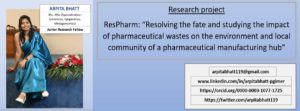
Hi, I am Arpita Bhatt, a major in Zoology, enrolled as a Ph.D. scholar in the Department of Medical Microbiology, Post Graduate Institute of Medical Education and Research, Chandigarh, under the guidance of Prof. Dr. Neelam Taneja.
First time during graduation, I was introduced to the world of laboratory research when I was selected to work on a project as part of my Developmental Biology course, where I worked with an animal model (zebrafish). The aim was to study the impact of a drug on different developmental stages of zebrafish. I was fascinated by the transparency of the organism and its use in toxicology. The form changes in such a short time span! I started finding answers and learned that everything is beautifully interwoven at the gene level.
In the summer of 2017, I was the only student from my college selected for the Summer Undergraduate Research Program at the Dr. B. R. Ambedkar Center for Biomedical Research, Delhi. This was my first opportunity to conduct independent research under the guidance of Dr. Manisha Yadav. I cloned HIF1α from a human glioma cell line in the pET28a (+) expression vector using techniques such as PCR (Polymerase Chain Reaction), gel electrophoresis, automated image analysis, staining, mammalian cell culture, etc. I handled mammalian cell culture all by myself, and the fact that we could grow human cells on a flat plate intrigued me the most. The potential it possesses is immense.
Academic and research experience at the University of Delhi along with participation in national and international conferences was the perfect start to establish an academic and research-oriented approach. Now, I had a better understanding of the scientific field. How wet lab work is finally translated into a medically relevant form. I realized the importance of reproducible research and the merits of scientific communication. Hence, to continue my education in research, I decided to enroll in the MSc program at the Department of Zoology, University of Delhi, and got admitted in 2018. The practical classes along with the theory lectures broadened and narrowed the perspectives both at the same time. Previous concepts were completely moulded and now I understand them practically as well.
I was awarded the Summer Research Fellowship by the Indian Academy of Sciences in 2019 to work with Prof. Yogesh Shouche at National Center for Microbial Resource, National Center for Cell Science, Pune on the project- ‘identification of culturable microbes from Pune River samples using MALDI-TOF Mass Spectrometry and if unidentified then using 16S rRNA gene sequencing to examine the occurrence and abundance of Antimicrobial Resistance. I was able to identify 5 isolates and there were chances of finding more antibiotic-resistant bacteria which might be pathogenic as well. Results helped determine the current state and diversity of antibiotic-resistant bacteria prevalent in the river ecosystem. I learned microbial culturing and handling, and microbial bioinformatics which is the primary aspect of most of the research work in labs. The power of metagenomics became transparent to me because only around 2% of bacteria can be cultured in the laboratory. I became confident about my practical skills by the end of this internship. Therefore, I opted for Metagenomics, Epigenetics, and Genomics as the MSc specialization course. I worked with Professor Yogendra Singh for 6 months dissertation and learned protein expression and purification using mycobacterial nucleoidassociated protein. All these events made me interested in the microbial world. Drug resistance is a global challenge and needs to be dealt with.
I joined the RESPHARM project as it aims to tackle antimicrobial resistance in India. Once, I went to a pharmacy and was amazed to see that the girl sitting at the reception was literally prescribing medicines to an old lady. To my surprise, the lady had come for a follow-up. This made me wonder, whether the problem is a single-faceted one where the patient isn’t willing to visit the clinic or multiple reasons back the issue such as poverty, social stigma, lack of hospitals in remote areas, etc. The answer was of course multifaceted. Our project involves multiple Indian and UK collaborative partners who work as a team in dealing with the same. In addition, not only the biological but the social component arm of our project is the backbone. Being an Indian, I am very well aware of the scenario here in India when it comes to pharmaceutical industries. It indeed takes a village and is not the work of a single institute or individual when dealing with such global issues as antimicrobial resistance. Tackling AMR comes under the umbrella of one health approach as we need to consider the spread not only in humans but also in the environment and other beings with whom we are coexisting.
My part in the RESPHARM project involves mapping the sites selected for the research work, sample collection (Water, Soil, and Sediment), biological inactivation of environmental samples for pharmaceuticals extraction, water filtration, DNA extraction, sample preparation, and barcode labelling to be sent to specific partner institutes. Another interesting angle is the microbiological work on human isolates (urine, pus and stool). We collect the samples, culture them in the laboratory, and do antibiotic susceptibility testing to gather information about the prevalent microbes and their resistance profile in the Baddi and Kangra regions of Himachal Pradesh, India. All the collaborators of the project follow the same SOPs.


I am a believer of the saying “You are what you eat”. For my doctoral study, I wanted to work in a clinical setting and joined PGIMER when offered the position. I am interested in studying the interaction between the body’s gut microbiological and immunological components in a diseased state. Currently, I am working closely with our institute’s Gastroenterology and Microbiology departments, to address the etiopathogenesis of Inflammatory Bowel Disease.
ARPITA BHATT